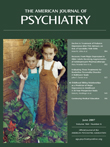To The Editor: We are grateful for the treatment in psychiatry article “Attention Deficit Hyperactivity Disorder and Substance Use Disorders”
(1), by Timothy E. Wilens, M.D., published in the Dec. 2006 issue of the
Journal . The article provides sound scientific and practical steps for clinicians encountering patients with co-occurring substance use and psychiatric disorders, a rampant challenge for clinicians today. However, we feel that the case presented is not a clear example of such encounters.
We have studied treatment-seeking students with “learning problems,” or attention deficit hyperactivity disorder (ADHD), who misuse psychostimulants, such as methylphenidate, for academic performance enhancement. A voluntary survey of 53 undergraduate stimulant abusers revealed that 94.3% of participants had smoked marijuana within the past month (32% smoking daily)
(2) . In the cases presented in this survey, as in the case presented by Dr. Wilens, cannabis use was the most likely cause of learning problems and psychostimulant-seeking behavior.
In the psychiatric evaluation in Dr. Wilens’s case, it is assumed that ADHD was present before (and independent of) the marijuana use during childhood/adolescence. Although the patient admitted displaying personality traits similar to those of his father (e.g., easily frustrated), these traits do not confirm an ADHD diagnosis. No family history of ADHD or other psychiatric disorders were mentioned in the case. Furthermore, all that “wheezes” is not asthma. Depression can be undiagnosed hyperthyroidism, cocaine dependence, or even mononucleosis
(3) . Every person with inattention/hyperactivity does not suffer from ADHD.
The case presented does exhibit symptoms typical of marijuana users
(4 –
6) . According to Fletcher et al.
(7), long-term cannabis use is associated with disruption of short-term memory, working memory, and attentional skills, all of which are exemplified in the case presented in Dr. Wilens’s article. If symptoms of ADHD were present in this case, they are likely to be the result of chronic substance abuse/dependence (in this case, marijuana). As exemplified in the section on the overlap between ADHD and substance use disorders, individuals with substance use disorders are more likely to be diagnosed with a psychiatric disorder, such as ADHD, than are individuals with a psychiatric disorder to be diagnosed with substance use disorders. Furthermore, as Dr. Wilens confirmed, in those individuals with comorbid substance use and psychiatric disorders, it is best practice to treat the substance use disorder, followed by treatment of the psychiatric disorder (if it persists).
In such cases, the primary clinical goal should not be “reduction,” but cessation of all nonmedical drug use, especially marijuana use, which is likely to require referral to long-term participation in a 12-step program, substance abuse treatment, and ongoing drug testing. Only prolonged abstinence from nonmedical drug use can allow for a diagnosis of ADHD to be made with confidence.

